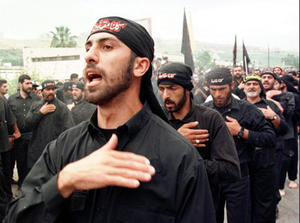TerrorismU.S. Congressman: Hezbollah greater threat than al Qaeda
Al Qaeda is perceived as the primary terror threat to the United States, but Congressman Peter King (R-New York), chairman of the House Homeland Security Committee, sounds the alarm that Hezbollah may be the greater threat

Hundreds, or perhaps thousands, of Hezbollah operatives may already be in the U.S. // Source: isvg.org
Since the attacks of 11 September 2001, the focus of the American security community has been on al Qaeda and its affiliates, and especially on Osama bin-Laden.
In the years that followed, through the efforts of the intelligence community and American special operations forces, the terror organization’s potential has slowly been degraded and its leadership decimated. The capture and interrogation of some of its key figures, along with the killing of others, degraded the group’s ability to plan and execute more attacks on the scale of 9/11, to the point where many analysts considered al Qaeda to be more of a brand or franchise than an active participant.
The greatest blow, and the one that received the universal acclaim of the public, was last year’s raid in Pakistan that killed Osama bin-Laden. Less noted, however, was the treasure trove of documents, computer records, and e-mails that were recovered from bin-Laden’s compound, and have been put to use further to degrade and even neutralize al Qaeda as an effective force.
In the public’s mind, al Qaeda is still the primary terror organization to be reckoned with. Now, however, a U.S. congressman has sounded an alarm about a potentially greater enemy, one with operatives already in the United States.
The Jerusalem Post reports that Congressman Peter King (R-New York) reveals that the intelligence community considers the Iran-funded Hezbollah to be a far greater threat than al Qaeda.
“It really is the ‘A’ team of international terrorism — far more sophisticated than al Qaeda,” King said in an interview with CNN’s Starting Point. “We do know that a number of them have been trained as terrorists, so the question is, how quickly they can be made operational, and would they carry out an attack…”
King goes on to say, “We estimate it to be at least in the hundreds maybe the thousands of Hezbollah agents here in this country. And again, especially if things intensify between Israel and Iran, between the United States and Iran, could Iran take preemptive action in this action through Hezbollah?”
It is known that Hezbollah has had a number of agents in the United States for years, largely focused on fundraising and recruiting. The escalating tension between Israel and Iran, however, and between the United States and Iran, raises the stakes of Hezbollah’s presence.
Writing in the Huffington Post, Andrea Stone reports on a series of suspicious incidents involving Iranian diplomatic personnel since 2003.
Stone reports that security guards from the Permanent Mission of Iran to the United States have been observed photographing and videotaping subway train tracks, the track layout inside Grand Central Station, and using tour buses to videotape and photograph various New York City landmarks and infrastructure components, including the water line and the structure of the Wall Street Heliport.
Stone quotes Mitchell Silber, head of the NYPD Intelligence Division, as saying: “Iran has a proven record of using its official presence in a foreign city to coordinate attacks, which are then carried out by Hezbollah agents from abroad, often leveraging the local community — whether wittingly or not — as facilitators.”
